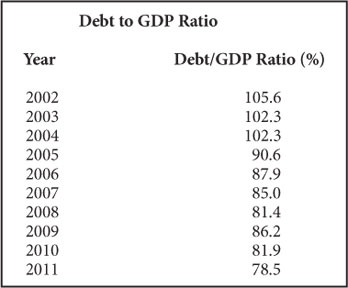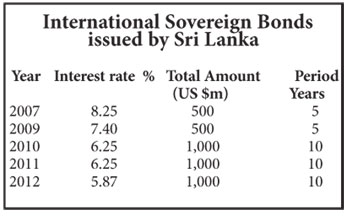Lanka on track to reduce debt levels
 In recent times, much has been said about the debt levels of our
country. Some Opposition politicians as well as economists whose
leanings towards the Opposition are well-known, have been ringing alarm
bells that the country is fast moving into a debt trap. In recent times, much has been said about the debt levels of our
country. Some Opposition politicians as well as economists whose
leanings towards the Opposition are well-known, have been ringing alarm
bells that the country is fast moving into a debt trap.
Others including the Central Bank and the Ministry of Finance have
countered that the debt levels are sustainable. This matter is obviously
a critical one, since the Eurozone debt crisis has shown what could
happen if the debt levels of a country get out of hand.
In that background, it would be appropriate to examine the country's
debt issue in a dispassionate, non-political and professional manner, so
as to assess whether the risks associated with a country's borrowings
are being addressed by the relevant authorities in Sri Lanka.
In practice, a person's debt level would be a factor of his income.
This is observed in real life, when a person with a lower income is only
able to borrow a small loan, while a person with a higher income and
assets will be able to obtain bigger advances. Another practical truth
is that if a loan is used for a productive purpose which yields an
income, the viability of such a loan is generally greater, than if the
loan is used for mere consumption.
The repayment capability of a loan is better, if the repayment is
over a longer period of time. In addition, the interest rate is usually
higher, if the credit worthiness of the borrower is low which leads the
lender to demand a higher interest rate to compensate his risk, or in
times of higher inflation in the country.
 The above practical considerations that are applicable to any
borrower, also apply in a more sophisticated and complex manner to
countries and governments as well. Therefore, a pragmatic and practical
reasoning must be applied in a sensible manner, when assessing the
sustainability of the debt of a country. The above practical considerations that are applicable to any
borrower, also apply in a more sophisticated and complex manner to
countries and governments as well. Therefore, a pragmatic and practical
reasoning must be applied in a sensible manner, when assessing the
sustainability of the debt of a country.
In the case of a country, the capacity for repayment is primarily
evaluated through the Debt to GDP ratio. Sri Lanka's Debt to GDP ratio
over the past 10 years is shown in the table.
It indicates that Sri Lanka is on a clear path of reducing its debt
levels in comparison to its GDP. That is a step in the right direction.
At the same time, there have been reports issued by the Central Bank
that they are attempting to reduce the debt to GDP level to about 60
percent by 2016.
That attempt too, would be useful since it would lead the country to
a comfortable debt level, which would be a significant improvement from
the alarming level of over 105 percent ten years ago.
Over the past six years, the Central Bank has stated that new loans
have been obtained to fund viable infrastructure development projects
only. If such a discipline is exerted over the debt dynamics, the
overall sustainability of the Debt would certainly be enhanced. In the
period prior to 2001, massive loans of over US$ 600 million had been
obtained for the import and consumption of wheat flour.
Needless to say, those consumption-based foreign currency loans have
imposed a major burden on the economy since no economic activities and
resultant revenue has been earned from the corresponding application of
the borrowed foreign funds. Therefore, the Government's firm commitment
that it will not obtain loans of such nature is certainly welcome.
In the meantime, the Central Bank has stated that it is implementing
a strategy of consciously extending the overall repayment period of its
portfolio. Such a strategy too is useful, since an extended repayment
period would apply lower pressure on the debt repayment schedule, which
would, in turn, help improve debt sustainability further.
As is well-known, Sri Lanka has traditionally been a high inflation
nation where inflation has been in double digit numbers for long periods
of time. Of late however, Sri Lanka has been able to maintain inflation
at single digit levels, and has done so for the past 42 months. This
achievement has helped to maintain interest rates at reasonable levels.
 Nevertheless, the country's interest rates are still higher than in
other developed nations, and this situation needs to be addressed over
the next few years. Maintaining inflation and interest rates at
reasonable levels, while improving macro fundamentals in a consistent
manner and thereby upgrading the country's credit rating, will help Sri
Lanka to access funds at lower interest rates in time to come. Nevertheless, the country's interest rates are still higher than in
other developed nations, and this situation needs to be addressed over
the next few years. Maintaining inflation and interest rates at
reasonable levels, while improving macro fundamentals in a consistent
manner and thereby upgrading the country's credit rating, will help Sri
Lanka to access funds at lower interest rates in time to come.
Fortunately, there seems to be a macro level plan and effort to
achieve such an outcome, and that is encouraging. The interest rates
secured by the country in its past international bond issues also seem
to suggest a growing credit worthiness of Sri Lanka as viewed by its
expanding network of international investors .
The above analysis should provide some comfort to an unbiased
stakeholder that Sri Lanka is on a sustainable debt path, unlike some
advanced countries that are struggling with heavy debt burdens.
Therefore, there should no cause for unnecessary apprehension and panic,
as predicted by some politicians and economists.
However, it is necessary for the Government and the Central Bank to
keep in mind that the current global debt dynamics is highly complex and
volatile, and therefore the on-going commitment to reduce the Government
fiscal deficit and deliver benign levels of inflation must be continued
in earnest. That approach would certainly provide a lot of confidence to
all stakeholders of the economy.
|

